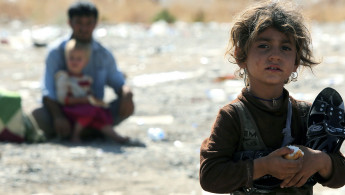Kurdish restrictions on movement harming Sinjar's struggling Yazidi community
Human Rights Watch has said that restrictions on the movement of goods around Sinjar is harming the well-being of Iraq's Yazidi community.
2 min read
Yazidis are a minority of Iraq [Getty]
Kurdish restrictions on the movement of goods are harming the recovery of Iraq's Yazidi minority, which was targeted for genocide by the Islamic State group, Human Rights Watch said Sunday.
The campaign group argues that restrictions imposed by the autonomous Kurdish government "disproportionate to any possible security considerations are causing unnecessary harm to people's access to food, water, livelihoods, and other fundamental rights".
It said the restrictions affected the Sinjar area - the main hub of the Yazidis - a Kurdish-speaking religious minority whose unique faith is despised by IS militants.
The area is theoretically under the authority of the central government in Baghdad, but it is largely controlled by the forces of the autonomous Kurdish region.
"The KRG should be working to facilitate access to Sinjar for the hundreds of Yazidi civilians wishing to return to their homes, not adding more barriers to their recovery," HRW said.
It said it had not been able to find a single farmer who had been granted a permit to take his produce to the Kurdish region.
The human rights' group said the Kurdish authorities argued they were concerned about the activities of the Kurdistan Workers Party (PKK).
The separatist rebel group - which is also present in neighbouring Turkey - has long had bases in northern Iraq but stepped up its presence there after IS swept through the region in 2014.
It is outlawed by Ankara, which is the closest ally of the Iraqi Kurdish region's leadership.
According to HRW, there were around 360,000 Yazidis in the Sinjar area before 2014, 90 percent of whom were displaced by the violence. Very few have returned.
The United Nations said IS committed genocide against the minority, which is neither Arab nor Muslim and faces continued isolation.
Thousands of Yazidis were massacred when IS took over the Sinjar area in August 2014 and thousands of Yazidi women abducted and forced into sex slavery.
The campaign group argues that restrictions imposed by the autonomous Kurdish government "disproportionate to any possible security considerations are causing unnecessary harm to people's access to food, water, livelihoods, and other fundamental rights".
It said the restrictions affected the Sinjar area - the main hub of the Yazidis - a Kurdish-speaking religious minority whose unique faith is despised by IS militants.
The area is theoretically under the authority of the central government in Baghdad, but it is largely controlled by the forces of the autonomous Kurdish region.
"The KRG should be working to facilitate access to Sinjar for the hundreds of Yazidi civilians wishing to return to their homes, not adding more barriers to their recovery," HRW said.
It said it had not been able to find a single farmer who had been granted a permit to take his produce to the Kurdish region.
The human rights' group said the Kurdish authorities argued they were concerned about the activities of the Kurdistan Workers Party (PKK).
The separatist rebel group - which is also present in neighbouring Turkey - has long had bases in northern Iraq but stepped up its presence there after IS swept through the region in 2014.
It is outlawed by Ankara, which is the closest ally of the Iraqi Kurdish region's leadership.
According to HRW, there were around 360,000 Yazidis in the Sinjar area before 2014, 90 percent of whom were displaced by the violence. Very few have returned.
The United Nations said IS committed genocide against the minority, which is neither Arab nor Muslim and faces continued isolation.
Thousands of Yazidis were massacred when IS took over the Sinjar area in August 2014 and thousands of Yazidi women abducted and forced into sex slavery.





 Follow the Middle East's top stories in English at The New Arab on Google News
Follow the Middle East's top stories in English at The New Arab on Google News
![Israeli forces ordered bombed Gaza's Jabalia, ordering residents to leave [Getty]](/sites/default/files/styles/image_330x185/public/2176418030.jpeg?h=a5f2f23a&itok=_YGZaP1z)

